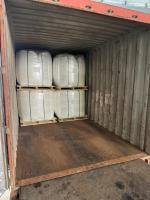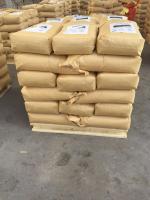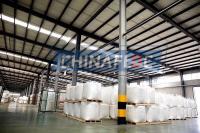Our Products
Flocculant / Anionic flocculant senfloc 5210 senfloc 5160 can be replaced by Chinafloc A0310 and Chinafloc A0712

senfloc 5210 senfloc 5160 are two kinds of anionic flocculant with lower and medium hydrolysis degree mainly used for mineral processing and water treatment ,Chinafloc A0310 and Chinafloc A0712 can replace of them with good result
Anionic flocculants with a lower degree of hydrolysis are specialized polymers that exhibit specific behaviors and properties, making them suitable for certain industrial applications. These flocculants possess a limited number of hydrolyzed carboxyl groups, resulting in a moderate anionic charge density. This unique characteristic provides a balance between reactivity and versatility, making them effective in scenarios where higher or lower charge densities may not perform optimally. Here are the main applications of anionic flocculants with a lower hydrolysis degree:
1. Water and Wastewater Treatment
Municipal Wastewater Treatment
In municipal wastewater treatment, anionic flocculants with lower hydrolysis degrees are employed to enhance the removal of suspended solids and organic matter. These flocculants are particularly effective in primary and secondary clarification processes, where they aggregate fine particles into larger, settleable flocs. Their moderate charge density helps in achieving optimal floc formation without excessive consumption or destabilization of the system.
Industrial Wastewater Treatment
Anionic flocculants are used in various industrial sectors to treat wastewater containing different contaminants. In industries such as textiles, food processing, and petrochemicals, wastewater often contains a mix of organic and inorganic pollutants. Anionic flocculants with lower hydrolysis degrees are ideal for these applications as they provide effective flocculation of a wide range of particles without excessively altering the water chemistry.
2. Mining and Mineral Processing
In the mining industry, anionic flocculants with lower hydrolysis degrees are utilized for solid-liquid separation processes, particularly in the treatment of tailings and mineral slurries. They help in the efficient sedimentation of fine particles, enhancing the clarity of process water and facilitating the recovery of valuable minerals. These flocculants are also effective in controlling dust and reducing the environmental impact of mining operations.
3. Paper and Pulp Industry
The paper and pulp industry benefits from the use of anionic flocculants with lower hydrolysis degrees in several ways:
Clarification of Process Water
These flocculants are used to clarify process water, removing fine particles and colloidal substances. This ensures that the water used in paper production is of high quality, preventing contamination and improving the overall efficiency of the production process.
Paper Sheet Formation
In the wet-end of the paper machine, anionic flocculants help in the retention of fine particles and fillers within the paper sheet. This improves the strength and quality of the final product, as well as enhances the efficiency of the papermaking process.
4. Oil and Gas Industry
Enhanced Oil Recovery
In enhanced oil recovery (EOR) processes, anionic flocculants with lower hydrolysis degrees are used to improve the viscosity of water injected into oil reservoirs. This helps in displacing more oil from the reservoir, enhancing the overall recovery rate. The moderate charge density of these flocculants ensures effective interaction with the oil and reservoir rocks without causing excessive formation damage.
Drilling Fluids
Anionic flocculants are also used in drilling fluids to improve their rheological properties and facilitate the removal of drill cuttings. They help in maintaining the stability of the drilling fluid, reducing friction, and preventing the formation of clogs in the drilling equipment.
5. Food and Beverage Industry
Juice Clarification
In the food and beverage industry, anionic flocculants with lower hydrolysis degrees are used to clarify fruit juices and other beverages. They help in the removal of suspended solids and colloidal particles, resulting in clearer and more visually appealing products.
Wastewater Treatment
Food processing facilities generate wastewater that contains organic matter, fats, and other contaminants. Anionic flocculants are effective in treating this wastewater, helping to meet environmental discharge standards and facilitating the recycling of process water.
6. Textile Industry
In the textile industry, anionic flocculants with lower hydrolysis degrees are employed in the treatment of dyeing and finishing effluents. These effluents contain dyes, sizing agents, and other chemicals that need to be removed before the water can be discharged or reused. The moderate charge density of these flocculants makes them effective in aggregating a wide range of contaminants, improving the efficiency of the treatment process.
7. Pharmaceutical and Biotechnology Industry
In the pharmaceutical and biotechnology sectors, anionic flocculants with lower hydrolysis degrees are used for the purification of biological products and fermentation broths. They aid in the removal of cells, cell debris, and other impurities from culture media, ensuring the purity and quality of the final product. Their moderate charge density makes them suitable for sensitive applications where higher charge densities might cause unwanted interactions.
8. Agriculture
Soil Conditioning
Anionic flocculants with lower hydrolysis degrees are used in agriculture to improve soil structure and water infiltration. They help in reducing soil erosion, enhancing water retention, and promoting better root growth. This is particularly beneficial in arid and semi-arid regions where water conservation is crucial.
Irrigation Water Treatment
These flocculants are also used to treat irrigation water, removing suspended solids and other contaminants. This ensures that the water applied to crops is of high quality, preventing clogging of irrigation systems and promoting healthy plant growth.
9. Cosmetics and Personal Care Products
In the cosmetics and personal care industry, anionic flocculants with lower hydrolysis degrees are used to improve the stability and texture of products such as creams, lotions, and shampoos. They help in achieving the desired viscosity and ensuring uniform distribution of active ingredients.
10. Construction Industry
Concrete and Mortar Preparation
In the construction industry, anionic flocculants are used in the preparation of concrete and mortar. They improve the workability and stability of these mixtures, ensuring that they can be easily applied and provide the desired structural properties once cured.
Dust Control
Anionic flocculants are also used for dust control in construction sites. They help in agglomerating dust particles, reducing airborne dust, and improving air quality on-site.
Mechanism of Action
The effectiveness of anionic flocculants with lower hydrolysis degrees can be attributed to their ability to promote the aggregation of fine particles through various mechanisms:
Bridging Mechanism
Anionic flocculants adsorb onto the surface of particles, creating bridges between them that lead to the formation of larger flocs. This bridging mechanism is particularly effective in systems where particles have a natural tendency to aggregate.
Electrostatic Attraction
The moderate anionic charge density of these flocculants promotes electrostatic attraction between negatively charged flocculant molecules and positively charged particles. This helps in reducing repulsive forces between particles, facilitating their aggregation.
Hydrophobic Interactions
Anionic flocculants can also promote flocculation through hydrophobic interactions, where hydrophobic regions of the polymer interact with hydrophobic surfaces of particles, leading to aggregation.
Advantages of Anionic Flocculants with Lower Hydrolysis Degree
Anionic flocculants with lower hydrolysis degrees offer several advantages over other types of flocculants:
- Balanced Reactivity: Their moderate charge density provides a balance between reactivity and versatility, making them suitable for a wide range of applications.
- Reduced Sensitivity to pH: These flocculants are less sensitive to changes in pH, making them effective in systems with varying pH levels.
- Lower Residual Content: They tend to leave lower residuals in treated water, which is beneficial for applications where the presence of residual chemicals is undesirable.
- Minimal Impact on Water Chemistry: Their moderate charge density means they do not significantly alter the ionic balance of the water, making them suitable for sensitive applications.



400_small.jpg)

